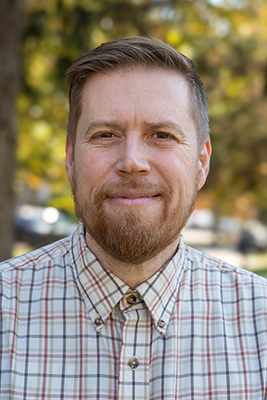Faculty Profile
Lars English
Professor of Physics (2003)Contact Information
on sabbatical Spring 2026
Tome Scientific Building
717-254-8925
http://www.larsenglish.com
Bio
Dr. English has published around 50 peer-reviewed research articles exploring “the nonlinear dynamics of complex systems.” His research interests broadly fall within the field of nonlinear and statistical physics. In recent years, topics have included: Intrinsic localized modes, solitons and skyrmions in nonlinear lattices; compact localized states and flat-band physics; spontaneous synchronization of oscillator arrays; instability and pattern formation; bifurcations, symmetry breaking and self-organization. He has studied (both experimentally and numerically) systems as varied as: nonlinear electrical transmission lines, chains of coupled pendula , networks of neuronal oscillators, spin lattices, and networks of electrical self-oscillators. In all of these systems, nonlinearity and lattice/network geometry play important roles, as they enable and guide processes of patterns formation. Broadly speaking, the aim is to experimentally characterize emergent patterns, study their onset and boundaries in parameter space, and to formulate mathematical models which allow a numerical and/or analytical exploration. Ideas from the field of dynamical systems (such as fixed points, stability, bifurcation, hysteresis, chaos) are essential in this endeavor. Other interests include the Calculus of Variations, magnetism and spin resonance, microwave spectroscopy, medical imagining techniques, and issues within the philosophy of science.
Education
- B.S., Denison University, 1996
- M.S., Cornell University, 1999
- Ph.D., 2003
